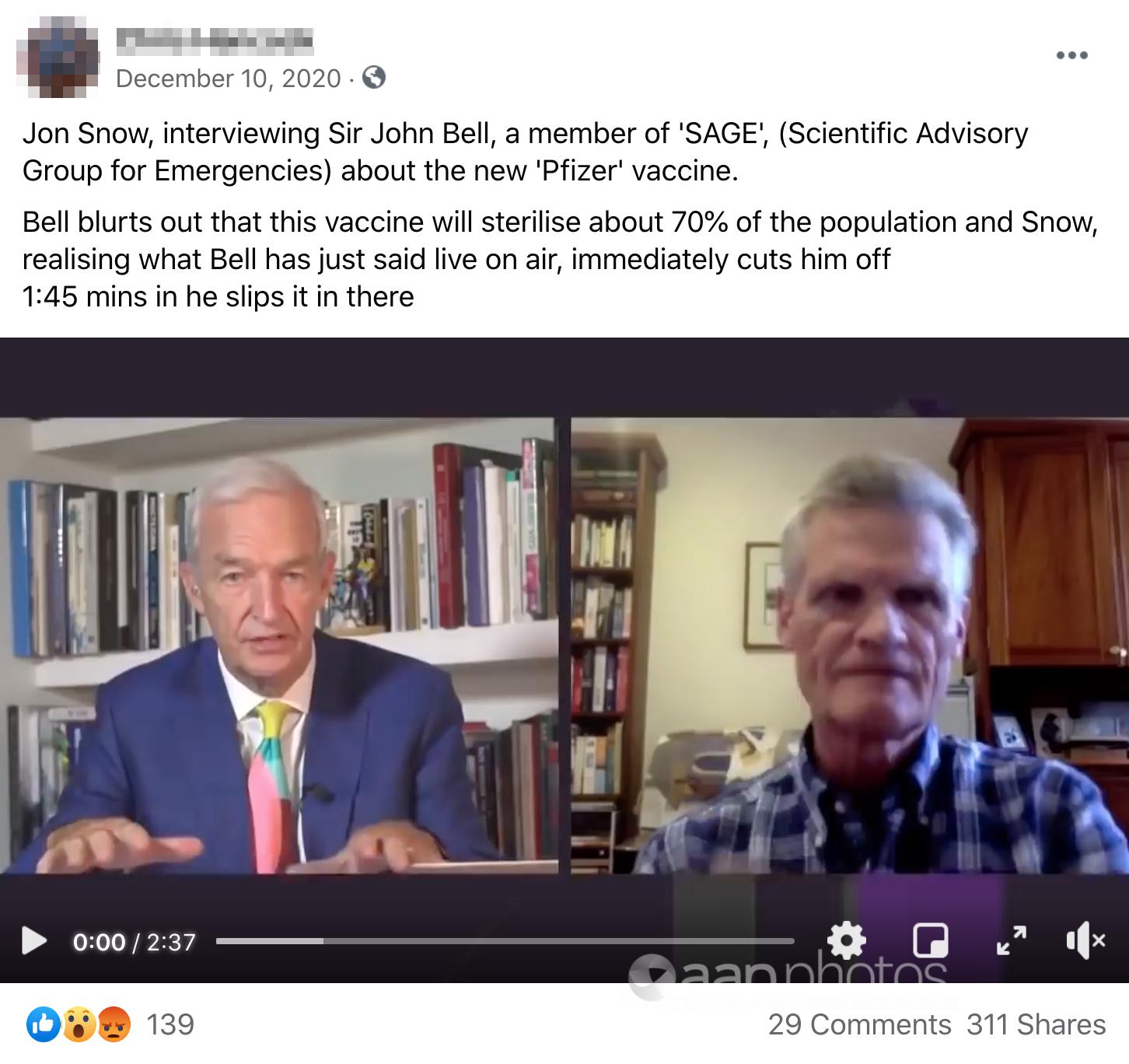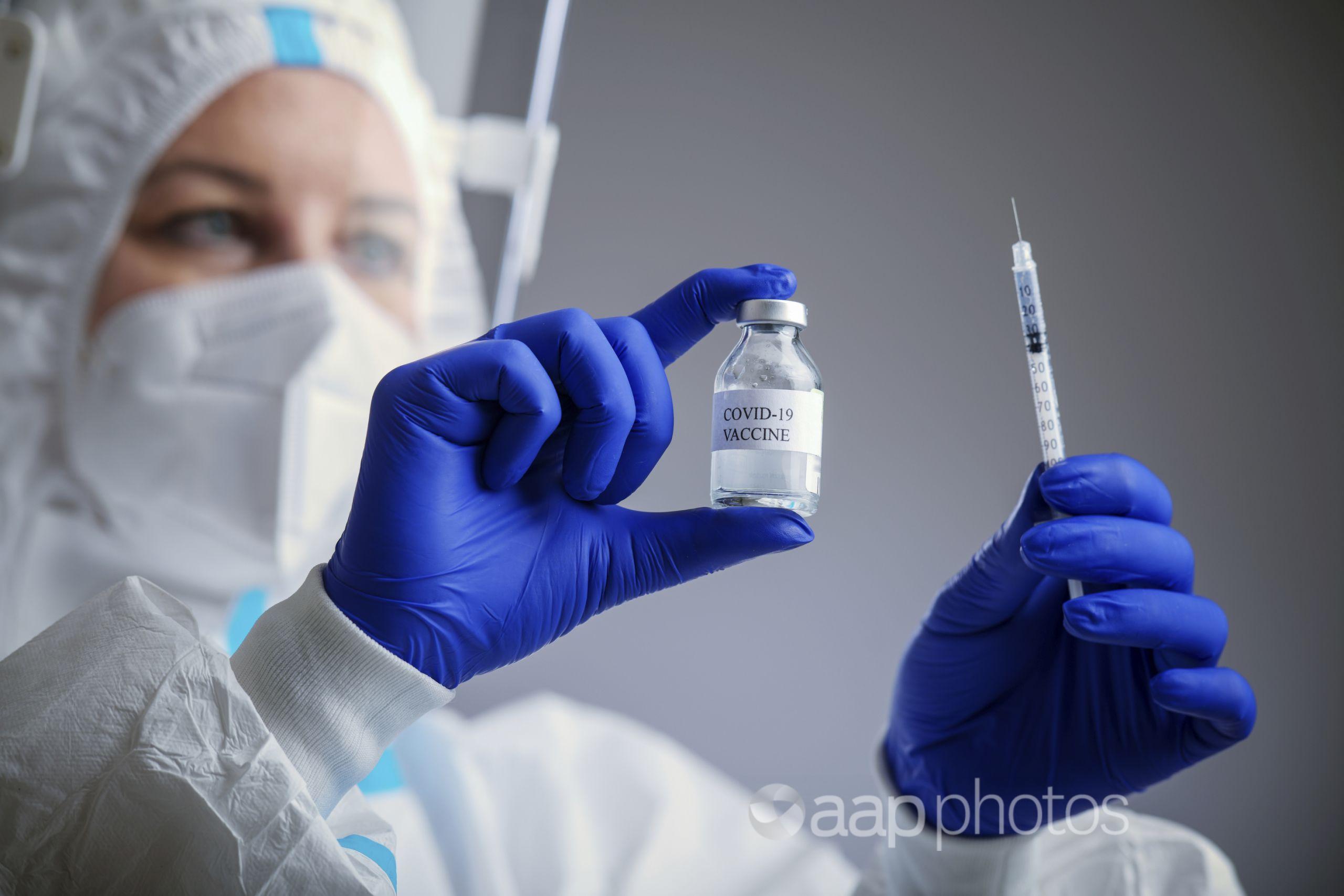The Statement
Multiple social media posts are using excerpts of a UK TV interview with Canadian immunologist Sir John Bell to imply COVID-19 vaccines may cause infertility.
One Facebook post, shared more than 300 times since December 10, suggests in its caption that Prof Bell “blurts out” the truth about the vaccine in the video: “Jon Snow, interviewing Sir John Bell … Bell blurts out that this vaccine will sterilise about 70% of the population and Snow, realising what Bell has just said live on air, immediately cuts him off.”
A similar clip of the interview was posted on YouTube on November 30 by a user who also promotes moon landing conspiracy theories. At the time of writing, it had been viewed more than 264,000 times.
The video’s description reads: “Believe him, someone who has these levels of credentials doesn’t misspeak without correcting himself … I am sure any infertility will be blamed on the virus.”
Clips of the interview segment have also been posted by social media users in Australia and New Zealand, including by Advance NZ, a political party whose page was previously suspended by Facebook for repeatedly sharing COVID-19 misinformation. In its version, the word “sterilise” is emphasised and the comment “Freudian slip?” added.

The Analysis
When Prof Bell used the word sterilise in the interview, it was not in relation to fertility. The regius professor of medicine at Oxford University and former president of the UK Academy of Medical Sciences told AAP FactCheck he was instead discussing how vaccines “sterilise” a community from COVID-19 by preventing the virus from spreading.
“I was referring to the ability of the vaccines to completely eliminate viral replication (ie sterilise) and (it) had no relevance to fertility,” Prof Bell told AAP FactCheck via email.
There is currently no evidence any COVID-19 vaccines cause infertility. AAP FactCheck previously debunked the false suggestion, which was based on the claim that a key protein for placenta formulation was also targeted by the immunisations.
The clip of Prof Bell is taken from an interview broadcast on Britain’s Channel 4 News on August 24, 2020, prior to COVID-19 vaccines being approved for emergency use by UK regulators. The interviewer is renowned journalist and presenter Jon Snow.
In answer to a question about when COVID-19 vaccines will become available, Prof Bell talks about the likely effectiveness of vaccines and the need for a robust regulatory approval process (from 7min 45sec in this version of the video from Channel 4):
“A lot of this depends on the intensity of infection. So, in order to get a readout, you have to have a certain number of incident cases in the control vaccine population. And that then tells you that you can look at the real vaccinated population and see whether they’ve been protected. So, I’m hoping that’s going to happen pretty smartly this Autumn.
“But then don’t forget, these vaccines are unlikely to completely sterilise the population. They’re very likely to have an effect which works in a percentage, say 60 or 70 per cent. We’ll have to look quite carefully, and the regulators will have to look quite carefully, to make sure that it’s done what we need it to do before it gets approved. So, there will be a delay between the outcome of the trial and a decision whether it can be approved as a vaccine.”
At no point in the interview does Prof Bell or the interviewer refer to fertility.
The post falsely suggests Snow “immediately” cut off Prof Bell; in reality, the interview continues for around 30 seconds after the “sterilise” comment before the veteran broadcaster moves to wrap up the item.
The idea that COVID-19 vaccines may cause infertility was advanced by German physician Wolfgang Wodarg and Michael Yeadon, a former Pfizer employee, who asked Europe’s health regulator to delay clinical trials and approval of the Pfizer/BioNTech vaccine.
The pair incorrectly claimed the vaccine would cause the formation of antibodies against the protein syncytin-1, which is involved in the development of the placenta.
However, as numerous fact checks and many experts have pointed out (see examples here, here and here), mRNA vaccines such as those from Pfizer/BioNTech and Moderna elicit immune responses to “spike proteins” from the SARS-CoV-2 virus that bear little relation to syncytin-1.
To help clear up the misunderstanding, a group of US reproductive health experts published an a journal article in January comparing the vaccine protein and syncytin-1. The study confirmed there is “little homology between the two proteins”.
They noted the body naturally produced antibodies to the virus protein when people became infected with COVID-19, however there was no indication of increased risk of miscarriage among pregnant women who were diagnosed with the illness.
The researchers concluded: “To make such a baseless claim without any scientific evidence to support this theory elicits unfounded fear in our patient population, and creates an unnecessary sense of hesitancy to receive the COVID-19 vaccine.”
Data from clinical trials undertaken for three major COVID-19 vaccines — from Pfizer/BioNTech, Moderna and AstraZeneca — show there was no significant difference in the rate of pregnancies or miscarriages among vaccinated participants compared with the control groups.
The Verdict
Professor Bell has confirmed to AAP FactCheck that his comments were about sterilisation from the COVID-19 virus and had nothing to do with fertility. The implication that he said COVID-19 vaccines will cause fertility issues is misleading.
There is no evidence to suggest any COVID-19 vaccines cause infertility, and related claims have been repeatedly debunked.
Missing Context – Content that may mislead without additional context.
* AAP FactCheck is an accredited member of the International Fact-Checking Network. To keep up with our latest fact checks, follow us on Facebook and Twitter.
All information, text and images included on the AAP Websites is for personal use only and may not be re-written, copied, re-sold or re-distributed, framed, linked, shared onto social media or otherwise used whether for compensation of any kind or not, unless you have the prior written permission of AAP. For more information, please refer to our standard terms and conditions.


















